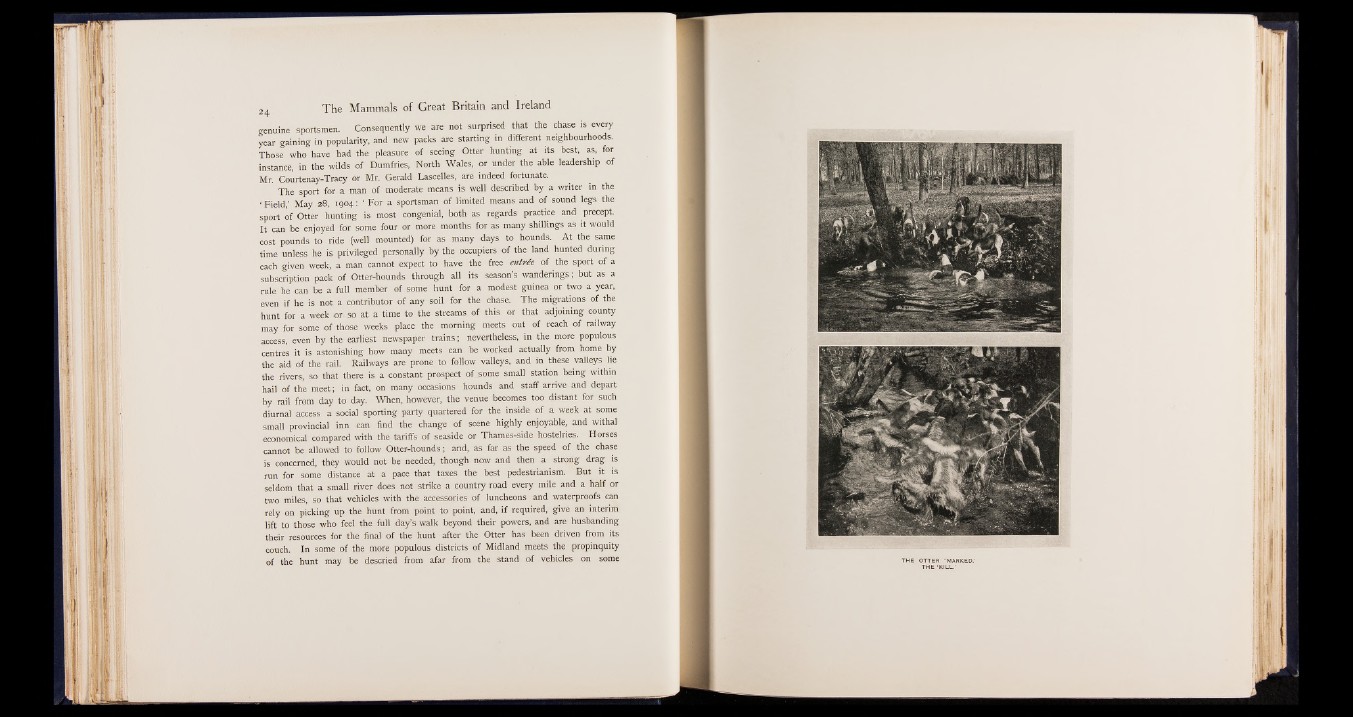
genuine sportsmen. Consequently we are not surprised that the chase is every
year gaining in popularity, and new packs are starting in different neighbourhoods.
Those who have had the pleasure of seeing Otter hunting at its best, as, for
instance, in the wilds of Dumfries, North Wales, or under the able leadership of
Mr. Courtenay-Tracy or Mr. Gerald Lascelles,1 are indeed fortunate.
The i| | r t for a man of moderate means is well described by a writer in the
‘ Field,’ May 28, 1904 : ‘ For a sportsman of limited means and of sound legs the
sport of Otter hunting is most congenial, both as regards practice and precept.
It can be enjoyed for some four or more months for as many shillings as it would,
[cost pounds to ride (well mounted) for as many days to hounds. At the same
time unless-he is privileged personally | | t h e occupiers of the land hunted during
each given week, a man cannot expect to have the free entrée of the sport of a
subscription pack of Otter-hounds through all its season’s wanderings ; but as a
rule he can be a . full member of some hunt for a modest guinea or two a year,
even if he id not a contributor of any soil for the chase.. The migrationf « t h q
hunt for a week or- so at a time to the streams of this or that adjoining county
may for some of those weeks place the morning meets out of reach of railway
access, even by the earliest newspaper trains ; nevertheless,, in the more populous
centres it is astonishing how many meets can be worked actually from home by
the aid of the rail. Railways are prone to follow valleys, and in these valleys lie
the rivers, so that there: is a constant prospect of_some small station being within
hail of the meet; in fact; on many occasions hounds- and staff arrive.and depart
by rail from day to day. When, however, the venue becomes tod distant for such
diurnal access a social; sporting party quartered for the inside of a week at some
small provincial inn can find the change of scene highly enjoyable, and withal
economical compared with the tariffs of seaside or Thames-side hostelries. Horses
cannot be allowed to follow Otter-hounds :;; and, as far as the speed of the chase
is concerned, they would not be needed, though now and then a strong drag is
run for some distance at a pace that taxes the best pedestrianism. But it is
seldom that a small river does not strike a country road every mile and a half or
two miles, so that vehicles with the accessories of luncheons and waterproofs can
rely on picking up the hunt from point to point, and, if required, give an interim
lift to those who feel the full day’s walk beyond their powers, and are husbanding
their resources for the final of the hunt after the Otter has been driven from its
couch. In some of the more populous districts of Midland meets the propinquity
of the hunt may be descried from afar from the stand of vehicles on some